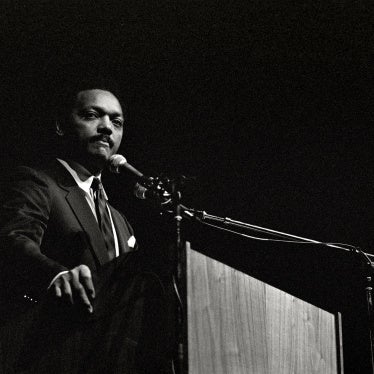|
Letter
Human Rights Watch Letter of Support for New York's Discovery for Justice Reform Act, S. 1716/A.1431
March 22, 2019
New York State Assembly
Legislative Office Building
Albany, NY 12248
New York State Senate
Legislative Office Building
Albany, NY 12247
Via email, regular mail, and fax
Dear members of the New York State Assembly and Senate,
Human Rights Watch urges you to support the Discovery for Justice Reform Act, S. 1716 (Sen. Bailey)/A. 1431 (Assemblymember Lentol),[1] which would apply fair and effective rules of criminal procedure to our courts. The bill would repeal the existing discovery law, also known as the “Blindfold Law,”[2] that prevents people accused of crimes from knowing the evidence against them until it is too late to prepare for trial. It would replace that law with rules requiring early and full disclosure, with safeguards to protect vulnerable witnesses, that would allow courts to reach the truth of the charges.
Human Rights Watch is an international organization that monitors violations of fundamental rights, investigates them and advocates for change of policy and accountability for perpetrators. The right to a fair trial, when accused of a criminal violation and exposed to punishment including jail and prison, is just such a right.
The current discovery law and practice in the state of New York creates prejudice against people accused of crimes, whether they are guilty or innocent. If an accused person does not have knowledge of the evidence against them, that person is not capable of preparing an effective defense or challenging the veracity or interpretation of evidence. Without disclosure of the witnesses who will testify against an accused person, that person is unable to investigate, to have the witnesses questioned to determine if they have a bias or mistook what they said they observed or only gave part of the story to police investigators. The result is that defense attorneys are forced to take cases to trial that they are unprepared to litigate, thus diminishing the trial’s chances of living up to its fact-finding purpose. Or accused people, fearing this forced lack of preparation will prejudice their case, plead guilty rather than risk an adverse verdict and harsher post-trial sentence. Innocent people, or those against whom prosecutors file excessive charges, are currently “blindfolded” by the existing law, and likely to plead guilty to avoid this risk.
Full and timely disclosure of the evidence in a case allows defense attorneys and accused people to understand what evidence the prosecutor has against the defendant, while also protecting all parties. This knowledge allows for more informed decisions concerning plea deals. Under the current law, prosecutors are not required to provide discovery of the evidence and witnesses to a person who has plead guilty. This rule provides a temptation to unscrupulous prosecutors to extract convictions from people regardless of actual guilt.
The Discovery for Justice Act establishes an orderly and reasonable requirement for discovery disclosures by both prosecution and defense. Prosecutors must disclose police reports, witness statements, witness contact information, tangible evidence like photographs and video, witness criminal histories and any exculpatory or mitigating evidence within a set timeframe, absent court permission for a delay or exceptions as appropriate. The defense must comply subsequently with their obligations, subject to Constitutional limitations. Disclosures give each side the opportunity to conduct investigations and to intelligently assess the strengths and weaknesses of their cases, in order to make appropriate decisions on how to proceed. Rather than being “trial by ambush,”[3] as Brooklyn District Attorney Eric Gonzalez described the current system, criminal litigation would better fulfill its truth-seeking ideals.
Prosecutors benefit from the existing rules. By closely guarding access to the evidence and keeping accused people from effectively preparing their cases, they maintain a substantial advantage in the courts. They claim the new rules will endanger witnesses and crime victims.[4]
This fear is unfounded. Many cases do not involve an identifiable victim or witnesses who are not law enforcement.[5] For those instances when there is an identifiable risk of harm to or intimidation of a witness, the Discovery for Justice Act provides strong mechanisms, including redactions, protective orders, and exceptions to discovery, that will serve as protection. A recent study of other states found “little evidence that open-file discovery endangers the safety of witnesses….”[6] New York’s discovery laws are among the most inequitable in the nation.[7] Only Louisiana,[8] Wyoming,[9] and South Carolina[10] allow prosecutors to refuse disclosure as is done in New York. Recently, both Texas[11] and North Carolina[12] have changed their discovery laws to provide more fair process, along the lines of the Discovery for Justice Reform Act. On signing their law, governor Rick Perry said: “[Texas] is known as a law and order state. With that tradition, however, comes a very powerful responsibility to make sure our judicial process is as transparent and open as humanly possible.”[13]
The right to understand the accusation against one and to confront one’s accusers means very little if that right is withheld until the day of trial or withheld altogether because that disadvantage resulted in a guilty plea. Existing law prevents accused people from mounting effective defenses, understanding the strength of the prosecutor’s case, and making informed decisions. It interferes with the truth-seeking role of our court process and severely damages the credibility of our courts as administrators of justice.
Fortunately, the New York legislature has the opportunity to fix this unfair aspect of the system by passing the Discovery for Justice Reform Act. Human Rights Watch urges you to support this needed legislation.
For more information or questions, please contact Laura Pitter, US Program Deputy Director, at pitterl@hrw.org or (917)-450-4361.
Sincerely,
John Raphling
Senior Criminal Justice Researcher
US Program, Human Rights Watch
cc: New York State Governor Andrew Cuomo
[1] Discovery for Justice Reform Act, S.1716/A. 1431, New York State Assembly, January 15, 2019, https://nyassembly.gov/leg/?default_fld=&leg_video=&bn=A01431&term=0&Summary=Y&Memo=Y&Text=Y# (accessed March 22, 2019).
[2] “New York’s Justice Reform Woes: Will the ‘Blindfold’ Come Off?” The Crime Report, February 14, 2019, https://thecrimereport.org/2019/02/14/new-yorks-justice-reform-woes-will-it-take-off-the-blindfold/ (accessed March 22, 2019).
[3] Eric Gonzalez, “Commentary: Reform discovery rules, writes district attorney,” Times Union, March 2, 2019, https://www.timesunion.com/opinion/article/Commentary-Reform-discovery-rules-writes-13656795.php (accessed March 22, 2019).
[4] Robert Gavin, “Soares, DAs not in love with governor's budget,” Times Union, February 2, 2019, https://www.timesunion.com/news/article/Soares-DAs-not-in-love-with-governor-s-budget-13584172.php (accessed March 22, 2019)
[5] Repeal the Blindfold Coalition, “The Discovery for Justice Reform Act Protects Witnesses,” February 2019, https://indefenseof.us/assets/images/Memo-on-Discovery-Reform-Witness-Safety-Feb-2019.pdf (accessed March 22, 2019).
[6] Jenia Turner and Allison Redlich, “Two Models of Pre-Plea Discovery in Criminal Cases: An Empirical Comparison,” Washington and Lee Law Review 73 (2016), https://papers.ssrn.com/sol3/papers.cfm?abstract_id=2747161 (accessed March 22, 2019).
[7] Emily Bazelon, “A Chance for Fairness in New York’s Criminal Justice System,” New York Times, February 28, 2019, https://www.nytimes.com/2019/02/28/opinion/cuomo-criminal-justice-reform.html (accessed March 22, 2019).
[8] LA Code Crim Pro 716 (2016), https://law.justia.com/codes/louisiana/2016/code-codeofcriminalprocedure/ccrp-716/ (accessed March 22, 2019).
[9]Tina Olson, “Criminal Discovery in Wyoming,” Wyoming Lawyer, http://digitaleditions.walsworthprintgroup.com/publication/?i=145774&article_id=1308313&view=articleBrowser&ver=html5#{%22issue_id%22:145774,%22view%22:%22articleBrowser%22,%22article_id%22:%221308313%22} (accessed March 22, 2019).
[10] South Carolina Judicial Branch, “Signatures on E-Filed Documents,” January 25, 2016, https://www.sccourts.org/courtReg/displayRule.cfm?ruleID=5.0&subRuleID&ruleType=CRM (accessed March 22, 2019).
[11] Article 39.14 Discovery, S.B. No. 1611, Legislature of the State of Texas, January 1, 2014, https://capitol.texas.gov/tlodocs/83R/billtext/html/SB01611I.htm (accessed March 22, 2019).
[12] House Bill 408, General Assembly of North Carolina, March 21, 2011, https://www.ncleg.net/Sessions/2011/Bills/House/PDF/H408v2.pdf (accessed March 22, 2019).
[13] Brandi Grissom, “Perry Signs Michael Morton Act,” Texas Tribune, May 16, 2013, https://www.texastribune.org/2013/05/16/gov-rick-perry-signs-michael-morton-act/ (accessed March 22, 2019).
Your tax deductible gift can help stop human rights violations and save lives around the world.
Region / Country
Related content
Most Viewed
-
June 3, 2025
“They’re Ruining People’s Lives”

-
April 27, 2021
A Threshold Crossed

-
November 25, 2019
A Dirty Investment

-
January 25, 2024
“We’re Dying Here”

-
November 19, 2012
Losing Humanity




